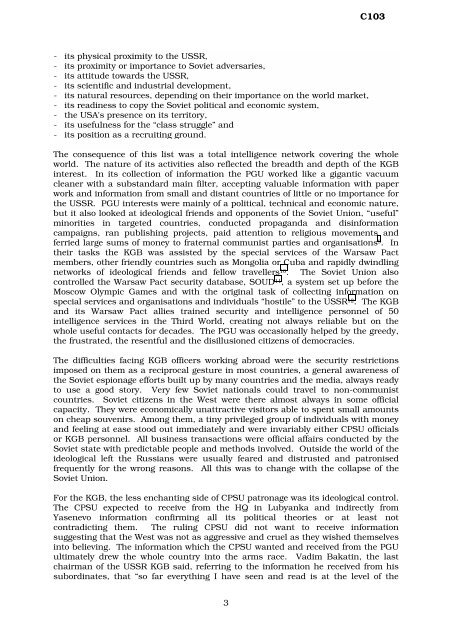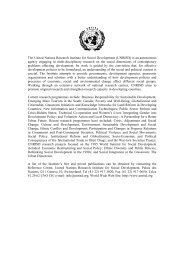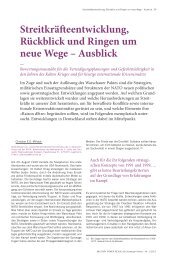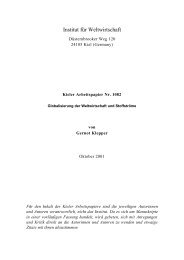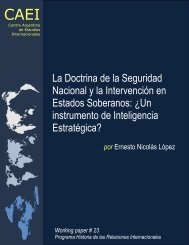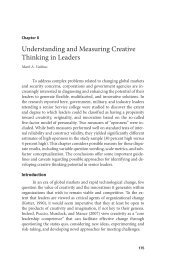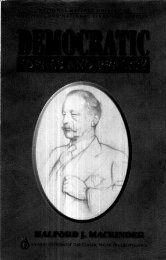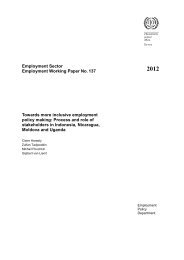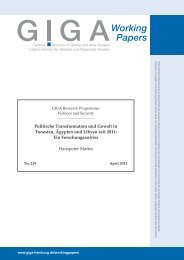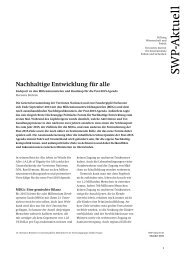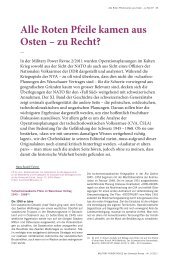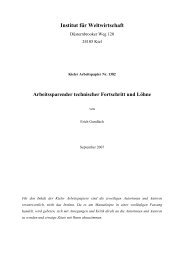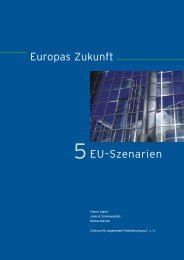You also want an ePaper? Increase the reach of your titles
YUMPU automatically turns print PDFs into web optimized ePapers that Google loves.
- its physical proximity to the USSR,<br />
- its proximity or importance to Soviet adversaries,<br />
- its attitude towards the USSR,<br />
- its scientific and industrial development,<br />
- its natural resources, depending on their importance on the world market,<br />
- its readiness to copy the Soviet political and economic system,<br />
- the USA's presence on its territory,<br />
- its usefulness for the “class struggle” and<br />
- its position as a recruiting ground.<br />
3<br />
C103<br />
<strong>The</strong> consequence of this list was a total intelligence network covering the whole<br />
world. <strong>The</strong> nature of its activities also reflected the breadth and depth of the KGB<br />
interest. In its collection of information the PGU worked like a gigantic vacuum<br />
cleaner with a substandard main filter, accepting valuable information with paper<br />
work and information from small and distant countries of little or no importance for<br />
the USSR. PGU interests were mainly of a political, technical and economic nature,<br />
but it also looked at ideological friends and opponents of the Soviet Union, “useful”<br />
minorities in targeted countries, conducted propaganda and disinformation<br />
campaigns, ran publishing projects, paid attention to religious movements and<br />
ferried large sums of money to fraternal communist parties and organisations 9. In<br />
their tasks the KGB was assisted by the special services of the Warsaw Pact<br />
members, other friendly countries such as Mongolia or Cuba and rapidly dwindling<br />
networks of ideological friends and fellow travellers 10. <strong>The</strong> Soviet Union also<br />
controlled the Warsaw Pact security database, SOUD 11, a system set up before the<br />
Moscow Olympic Games and with the original task of collecting information on<br />
special services and organisations and individuals “hostile” to the USSR 12. <strong>The</strong> KGB<br />
and its Warsaw Pact allies trained security and intelligence personnel of 50<br />
intelligence services in the Third World, creating not always reliable but on the<br />
whole useful contacts for decades. <strong>The</strong> PGU was occasionally helped by the greedy,<br />
the frustrated, the resentful and the disillusioned citizens of democracies.<br />
<strong>The</strong> difficulties facing KGB officers working abroad were the security restrictions<br />
imposed on them as a reciprocal gesture in most countries, a general awareness of<br />
the Soviet espionage efforts built up by many countries and the media, always ready<br />
to use a good story. Very few Soviet nationals could travel to non-communist<br />
countries. Soviet citizens in the West were there almost always in some official<br />
capacity. <strong>The</strong>y were economically unattractive visitors able to spent small amounts<br />
on cheap souvenirs. Among them, a tiny privileged group of individuals with money<br />
and feeling at ease stood out immediately and were invariably either CPSU officials<br />
or KGB personnel. All business transactions were official affairs conducted by the<br />
Soviet state with predictable people and methods involved. Outside the world of the<br />
ideological left the Russians were usually feared and distrusted and patronised<br />
frequently for the wrong reasons. All this was to change with the collapse of the<br />
Soviet Union.<br />
For the KGB, the less enchanting side of CPSU patronage was its ideological control.<br />
<strong>The</strong> CPSU expected to receive from the HQ in Lubyanka and indirectly from<br />
Yasenevo information confirming all its political theories or at least not<br />
contradicting them. <strong>The</strong> ruling CPSU did not want to receive information<br />
suggesting that the West was not as aggressive and cruel as they wished themselves<br />
into believing. <strong>The</strong> information which the CPSU wanted and received from the PGU<br />
ultimately drew the whole country into the arms race. Vadim Bakatin, the last<br />
chairman of the USSR KGB said, referring to the information he received from his<br />
subordinates, that “so far everything I have seen and read is at the level of the


